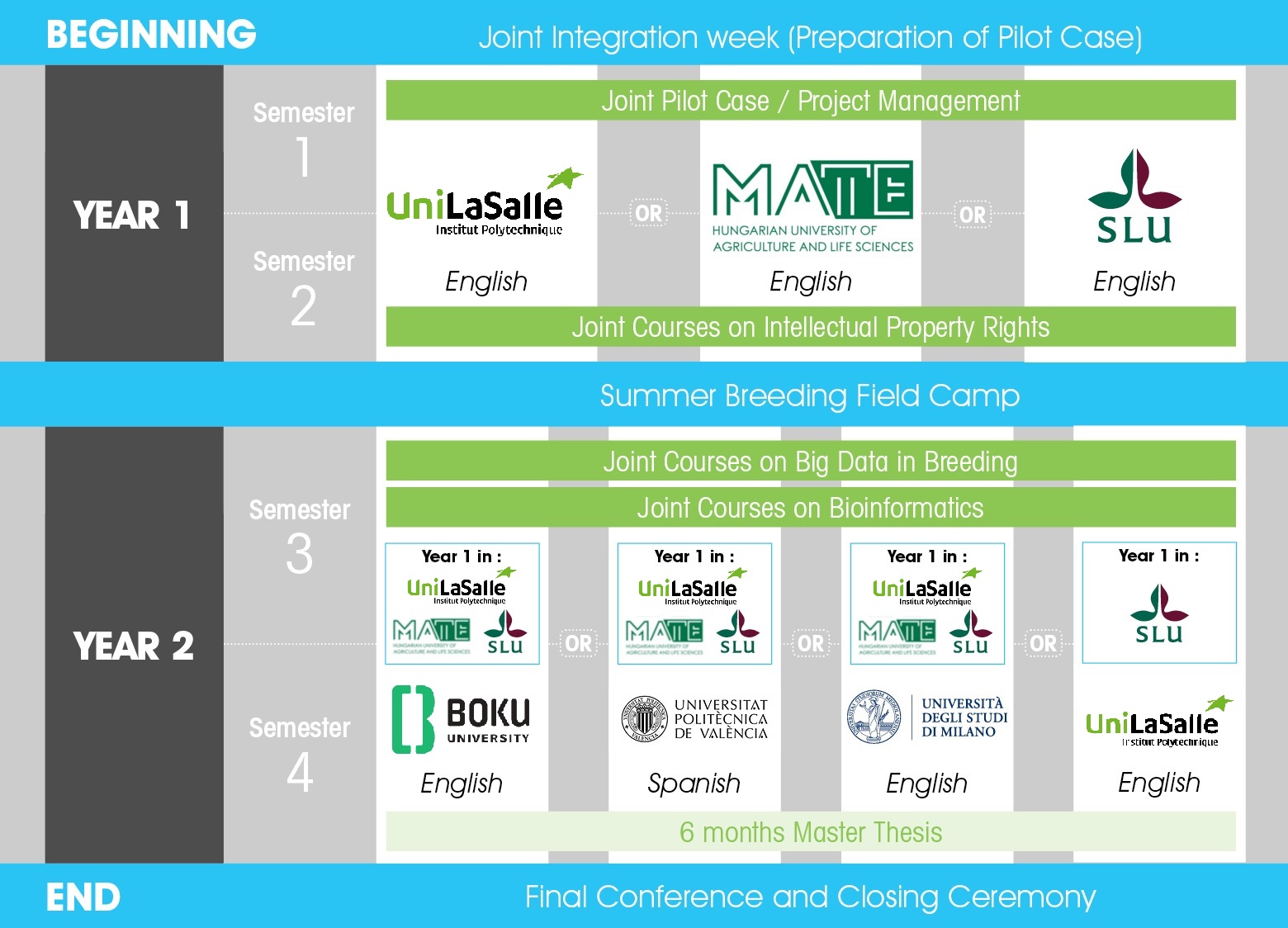Programme structure
emPLANT+ is a two year Master Programme of Excellence in the field of plant breeding and is composed of the following elements:
- The Joint Integration Week (all emPLANT+ students together)
- The first year of studies at ULS (France) or SLU (Sweden) or MATE (Hungary)
- The Joint Summer Breeding Field Camp (all emPLANT+ students together)
- The second year of studies at BOKU (Austria), UMIL (Italy), UPV (Spain) or ULS (France)
- The Final Conference and Closing Ceremony (all emPLANT+ students together)
Two joint courses are taught each academic year.
The complete list of courses is available in the Course Catalogue section.
The programme structure is as follows:

Preferred mobility tracks and specialisations
The Consortium offers 10 mobility tracks to combine the specialisations and strengths of all partners.
Preferred mobility track is asked in the application form.
Students must be hosted by two different universities of the Consortium and in two different Program Countries other than their own country of residence
First year at ULS or SLU or MATE
The three tracks at ULS, SLU and MATE are similar and still complementary, setting the basics in terms of plant biology, breeding methods and biotechnological tools:
> ULS:
- The courses introduction to seed business, plant reproductive system and relational databases are unique at ULS
- The education at UniLaSalle is focusing more directly on plant breeding, including plant genetics and practical aspects of plant breeding
- The track at ULS will be more attractive for candidates interested in applied plant breeding and seed business
> SLU:
- Parts of the course plant-microbe interaction are unique at SLU
- Education at SLU is focusing slightly more on basic plant biology, including plant genetics and biology subjects of importance for plant breeding
- The track at SLU will be more suitable for candidates interested in fundamental research and will target students with a high interest in biology
> MATE:
- Parts of the course molecular genetics are unique at MATE
- Education at MATE is focusing slightly more on basic plant biology, including plant genetics and biology subjects of importance for plant breeding
- A short internship is mandatory at the end of the year
- The track at MATE will be more suitable for candidates interested in applied research
Second year at BOKU, UMIL, UPV or ULS
The four different tracks at BOKU, UMIL, UPV and ULS will provide the students with the opportunity to specialise:
> BOKU:
- Offers you the possibility to select some courses in a panel
- Education at BOKU is focusing slightly more on genetic tools
- The track at BOKU will be more suitable for candidates interested in fundamental research
> UMIL:
- Parts of the course Marketing to breeding and Developing of crop ideotype are unique at UMIL
- Education at UMIL is focusing slightly more on applied breeding
- The track at UMIL will be more suitable for candidates interested in applied research
> UPV:
- Courses are more focused on ornamental and legume crops
- Courses are in Spanish
- Education at UPV is focusing slightly more on genetic tools
- The track at UPV will be more suitable for candidates interested in fundamental research
> ULS:
- Parts of the courses Seed contracts, Marketing & logistics, Modelization and phenotyping are unique at ULS
- Education at ULS is focusing slightly more on seed production and phenotyping tools
- The track at ULS will be more suitable for candidates interested in applied research and seed business
- An internship made in a company between the first and second year is mandatory
- The Master Thesis is compulsorily conducted at ULS research units
Language policy
All courses at BOKU, SLU, MATE, UMIL and ULS are taught in English, courses at UPV are taught in Spanish.
SLU, MATE and ULS offer Spanish courses to prepare students who select UPV for a B2 level for their stay (level B1 is compulsory at application stage).
All partners offer local language and culture courses to promote their academic success and facilitate their social and cultural integration.
At ULS, to obtain the emPLANT corresponding Master’s degree, all students must obtain a B1 level in French. Courses of French language are offered at ULS during the whole year as well as an official test at the end of the year. But ULS encourages the students to start learning basic French before coming (especially if you come only for the 2nd year, basic French is mandatory before coming).
Degrees awarded
Each student who succeeds the mandatory evaluations and who validates 120 ECTS, minimum 30 ECTS per semester, will receive a double degree, (i.e. the master’s degree of the year 1 institution and the master’s degree of the year 2 institution).
The degrees awarded are:
- Institut Polytechnique UniLaSalle: Ingénieur diplômé de l’Institut Polytechnique UniLaSalle, spécialité agronomie et agro-industries – Engineering Master Degree in Agronomy & Agro Industry
- Swedish University of Agricultural Sciences: Masterexamen med huvudområdet Biologi – Degree of Master of Science with a major in Biology
- Hungarian University of Agriculture and Life Sciences : Mezőgazdasági biotechnológus – MSc in Agricultural Biotechnology
- Universitaet Fuer Bodenkultur Wien (BOKU): Master of Science
- Universita Degli Studi di Milano: Laurea Magistrale in Scienze delle Produzione e della Protezione delle Piante – Master of Science in Agricultural Science, Crop and Plant Sciences
- Universitat Politècnica de València: Master Universitario Erasmus Mundus en Mejora Genética Vegetal por la Universitat Politècnica de València
All students will receive the diploma supplement of each university of their mobility track.
Degree issuing universities will also provide the student with an ECTS transcript of records with the grades and credits obtained.
